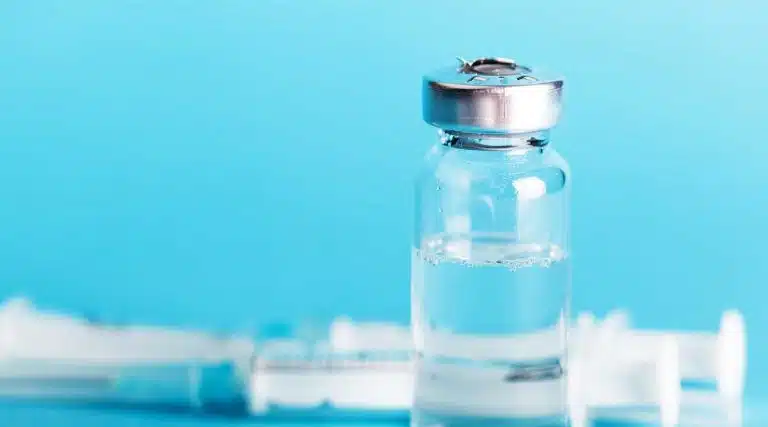Injecting Codeine | Side Effects & The Dangers Of Opioid Addiction

Codeine, a prescription painkiller, is one of the most commonly abused drugs in the United States. In its liquid form, codeine can be injected directly into the bloodstream. Codeine injections count as proper drug use only when given by a doctor, or with medical approval.
Injecting codeine without a prescription or approval is a form of drug abuse. Abusing codeine through injection is known as “shooting up” codeine. Injecting codeine comes with a number of health effects, some of which are severe.
Why Is Codeine Injected?
Codeine and other opioid analgesics (like nalbuphine) are injected to treat mild to severe pain relief. Doctors can administer legal codeine injections when necessary.
Codeine is an opioid agonist which affects the brain. Shooting up or injecting codeine brings it directly into the bloodstream, letting it reach the brain faster than swallowing. This method will result in a quicker, more effective pain reliever.
Which Codeine Products Are Injected?
Codeine phosphate is a liquid prescription drug that can be injected. Codeine and promethazine is an over-the-counter liquid cough syrup that can also be injected.
Codeine pills and tablets can also be converted to an injectable form. This method involves crushing a tablet into powder and mixing the powder with water. This solution is then drawn into a syringe and injected.
Codeine can be injected directly into the vein (intravenously), under the skin (“skin popping”), or into the muscles (intramuscularly).
Prescription codeine tablets can be popular injection targets because they are single-ingredient and do not require much distilling. Codeine and acetaminophen products, such as Codeine with Tylenol, can also be distilled and injected.
Health Risks Of Injecting Codeine
Shooting up codeine tablets is a form of drug abuse. Injecting liquid codeine without prescription guidelines is also a form of drug abuse.
Codeine has many well-documented side effects, including constipation, vomiting, and abdominal pain. Injecting codeine can add even more serious side effects.
When abused, codeine injection and illicit drug injection can have similar risks, including:
- infection and inflammation of the injection site
- collapsed veins
- using contaminated needles
- increased risk of HIV, hepatitis, and other bloodborne diseases
- increased risk of codeine addiction
Codeine Addiction
Opioid use reduces pain by reducing brain activity. A person in constant pain may see opioids as their only escape. Abusing opiates like codeine long-term may lead to addiction. Like other opioids (pentazocine, hydrocodone, butorphanol), codeine is an addictive substance.
Injecting codeine may lead to addiction. Signs of codeine addiction include:
- constantly thinking about the next dose
- cravings for codeine
- inability to stop using codeine
- injecting codeine despite declining health
Codeine Withdrawal Symptoms
A person may experience codeine withdrawal symptoms when they stop codeine after extended use. Withdrawal symptoms include:
- sweating or chills
- restlessness
- weakness
- anxiety
- insomnia
These symptoms can cause great discomfort and pain. People struggling with codeine addiction may choose to keep using codeine instead of enduring the pain of withdrawal.
Codeine Overdose
Opioid abuse puts a drug user at higher risk for opioid overdose. Shooting up codeine often involves high doses of codeine injected into the bloodstream. When abused, the dose of codeine injected can be life-threatening.
Signs of codeine overdose include:
- respiratory depression (shallow breathing)
- other breathing problems (noisy breathing, unusual snoring)
- cold or clammy skin
- pinpoint pupils (especially in the dark)
The drug naloxone can reverse codeine overdose in an emergency. It is most effective when combined with proper medical help. Call 911 immediately if you or a loved one experience these symptoms.
Treatment Options For Codeine Addiction
Abuse of pain medications has reached alarming levels in the United States. Treatment options are available for different types of opioid drug abuse. Some of these options are specific to opioid injection.
Syringe-Exchange Programs
Syringe exchange programs allow people to exchange used syringes for clean, sterile ones. Using sterile syringes greatly reduces the risk of contracting diseases from a used syringe. While these programs do not directly reduce the chances of drug abuse, they can connect people struggling with abuse to other resources, such as counseling and disease screening
Medication-Assisted Treatment
Along with behavioral therapy and counseling, the following medications can help treat opioid abuse, including codeine addiction:
- naltrexone
- buprenorphine
- methadone
Talk to your healthcare provider to discuss these treatment options, or contact us today to learn more.
Written by Ark Behavioral Health Editorial Team
©2024 Ark National Holdings, LLC. | All Rights Reserved.
This page does not provide medical advice.
Biomed Central - Prescription opioid injection among young people who inject drugs in New York City: a mixed-methods description and associations with hepatitis C virus infection and overdose - Harm Reduction Journal
Centers for Disease Control and Prevention - Syringe Exchange Programs --- United States, 2008
Food and Drug Administration - Codeine Phosphate - FDA
National Institute on Drug Abuse - Commonly Used Drugs Charts | National Institute on Drug Abuse
National Institute on Drug Abuse - Syringe-Exchange Programs are Part of Effective HIV Prevention | NIDA
Physiopedia - Intravenous Drug Abuse - Physiopedia
U.S. Department of Veterans Affairs - Codeine Injection

Questions About Treatment?
Ark Behavioral Health offers 100% confidential substance abuse assessment and treatment placement tailored to your individual needs. Achieve long-term recovery.
100% confidential. We respect your privacy.
Prefer Texting?
Our friendly support team is here to chat 24/7. Opt out any time.







 Learn More
Learn More








